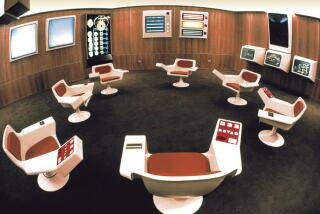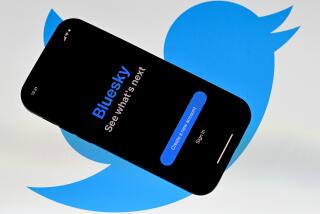Information wants to be rude
Cyberspace, to its early denizens, was supposed to be a prelapsarian world, free from the taint of commerce and other vices of “meatspace” (as the material world is known), full of sweetness and light and universal siblinghood. The preferred story line was Genesis in reverse: Our troubles started when Eve ate the apple of knowledge; now knowledge had accumulated to the point where it could undo the damage, reconstruct the apple (or Apple) and restore our innocence.
A decade ago, technology was the real counterculture. Geeks who did math were going to succeed where hippies who smoked dope and lefties who read Marx had failed. They were going to get us out of crass and ugly modern life and get us back to the Garden.
Or, in the language of William Blake’s famous hymn, the founders of cyberspace believed that they were building Jerusalem amid the dark satanic mills.
Well, have you visited cyberspace lately? Of course you have. And of course the Internet has vastly improved life for anyone likely to be reading this column. But as a friendly place to hang out, give me meatspace any day. The only thing cyberspace has in common with Eden is snakes.
There is commerce aplenty -- but that’s not the problem. The happiest and most peaceful parts of the World Wide Web are the places where people are buying things. The nasty parts are where people are doing what the Founding Surfers intended: expressing themselves and forming communities.
Why is the tone of conversation on the Internet, especially about politics, so much lower than in the material world? E-mail can be a fabulous medium for serious discussion, combining as it does the spontaneity of talking with the opportunity for reflection inherent in writing it down.
But most of the e-mail I get doesn’t realize this potential. For the last few weeks, my in-box has been clogged almost to the point of unusability, with nearly identical e-mails from people who disagree with my interpretation of the notorious Downing Street memos. (Don’t know what the DSM are? Lucky you.) As an attempt to change your mind, one e-mail may be a sincere appeal to reason and evidence, but 500 e-mails is a blunt instrument.
And nasty? Oh my goodness. Give me those scary old pre-e-mail letters that journalists used to get -- written in purple or red crayon on mysteriously stained stationery from the Bates Motel -- any day.
Maybe the anonymity of e-mail empowers people to shed their usual carapace of politeness. Or maybe banging out an e-mail is just so easy -- compared with all the necessary elements of writing a letter (finding a stamp and remembering to mail it, to name only two of the more daunting) -- that the id can send out half a dozen e-mails before the superego can stop it.
Or maybe those cyberspace geeks are just too under-socialized -- sitting in front of their computers and sharing their bitterness with the world. “On the Internet,” says the dog in the famous New Yorker cartoon, “nobody knows you’re a dog.” On the Internet, nobody knows you’re a loser either.
Although technology and other aspects of modern life (superhighways, suburbs, TVs with too many channels) have isolated us from one another, the Internet was supposed to reverse this trend. That promise has been realized in many ways. People with a shared interest in volleyball or human rights in Estonia or collecting early Waring blenders can find one another and enjoy the company. Physical proximity is irrelevant.
Old-fashioned geographical communities have non-soulmates rubbing up against each other. The challenge is to make them “all just get along,” as we say here in Los Angeles. In cyberspace, you don’t have to get along with people who are different. You’re not going to bump into them in the aisles of Amazon.com. This makes cyberspace communities far touchier about defending their sphere and their interests. And the instant communication tools of cyberspace (mainly e-mail) make it easier to develop a grievance and promote it.
Cyberspace communities -- and the cyberspace community at large -- often seem to be more energized by rejecting heathens than by embracing soulmates. They love staging inquisitions and anathemas. I am amazed by the hostility that greets any effort to stroll into the club room and buy the boys a round of drinks.
Recently at The Times, we tried using a Web innovation called “wiki” -- a shared-editing process very much in the cyberian spirit. For two days, thousands of people seemed to be enjoying it. But our e-mail boxes oozed with unwelcoming contempt from cyberoids. (Except for the real innovators of wiki -- the founders of the amazing wikipedia.com -- who were helpful and sympathetic.) Then a guerrilla attack in the dead of night flooded the site with pornography, and we had to take it down.
What gets called “community” on the Web usually consists of various ways that surfers share their views. But “share” is misleading. It implies that you are interested in learning the views of others, as well as expressing your own. That does not tend to be the case in cyberspace, any more than it is in meatspace.
It’s not surprising that cyberians make lousy communitarians. Libertarian instincts are a more natural political fit with the silicon lifestyle. “Do your own thing and let others do theirs” is one of the big themes of the 1960s that had an unexpected second wind thanks to the geek counterculture.
But here too, the ugliest aspects of libertarianism -- the me-me-me, the stay-out-of-my-space -- have dominated, while the more attractive libertarian vision (people wandering around in robes, picking flowers and writing poetry and ignoring each other and enjoying the silence, or something like that) hasn’t played much of a role.
The rallying cry of the early cybernauts was “information wants to be free.” Information is what the Internet delivers -- all that it delivers, really -- and advanced economies are more and more about information and less and less about physical matter. So free information was supposed to mean a lot more than no charge for 411. It implied a world without money, where the path between you and your dream was frictionless.
Whatever information may want, producers of information prefer to be paid. In meatspace, this desire is considered reasonable. Most consumers in cyberspace consider it reasonable as well. But some don’t. “Information wants to be free” may once have carried the poetic image of liberating information. All it is now is a silly rationale for ripping other people off.
Eden, it ain’t.






